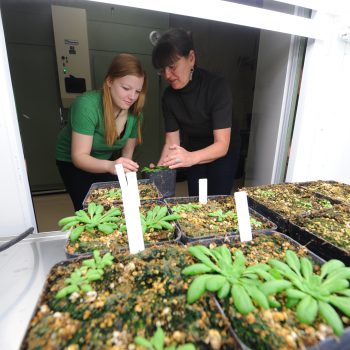 An article by the American Association for the Advancement of Science (AAAS) features a grant awarded to Washington State University to test multiple heat and pest scenarios.
An article by the American Association for the Advancement of Science (AAAS) features a grant awarded to Washington State University to test multiple heat and pest scenarios.
Washington State University researchers are undertaking an industrious investigation into the effects of global warming on plants. Making the effort possible is a fully automated “plant hotel” that can analyze up to 6,000 seedlings in a single experiment.
Kiwamu Tanaka, an assistant professor in plant pathology, and Henning Kunz, an assistant professor in plant physiology, recently received funding from the MJ Murdock Charitable Trust for the LemnaTec Scanalyzer Discovery Platform. It will let the scientists mimic natural light and simulate a wide range of changing climate conditions.
‘Key to life and health’
The researchers expect the new technology will be used by at least 20 research groups on the Pullman campus.
“A lot of biologists are very interested in this machine because they want answers to the question of how plant photosynthesis is affected, because photosynthesis is the key to our life and health,” said Tanaka.
The researchers will aim to find the genetic underpinnings of how plants react to stressors like drought, heat, pathogens and pests, as well as the salt that can accumulate in soils drying more quickly in a warming environment. They hope to link traits like stress tolerance back to plant genomes by introducing mutations and seeing how the plants respond.
“Climate change is increasing both global temperatures and the concentration of CO2 in the atmosphere,” said Kunz. “However, it is unclear how these two factors will offset the ability of plants to take up and assimilate atmospheric CO2 during photosynthesis.”
Designing crops to withstand change
In addition to $480,000 provided by the Murdock trust, WSU’s College of Arts and Sciences, College of Agriculture, Human and Natural Resource Sciences, School of Biological Sciences and Office of Research provided a little more than $500,000 to help pay for the machine.
The research fits squarely into WSU’s Grand Challenges, initiatives aimed at particularly pressing societal concerns. In their application, Kunz and Tanaka said the work is particularly relevant to the challenge on food, energy and water. Plants “provide the backbone” of human and animal nutrition, they said, while serving as a sustainable energy source.
Also, they said in their grant application, “due to climate change and extensive drought conditions, it is becoming important to breed and design crop plants that are drought tolerant and deliver robust yields even under limited water availability.”







